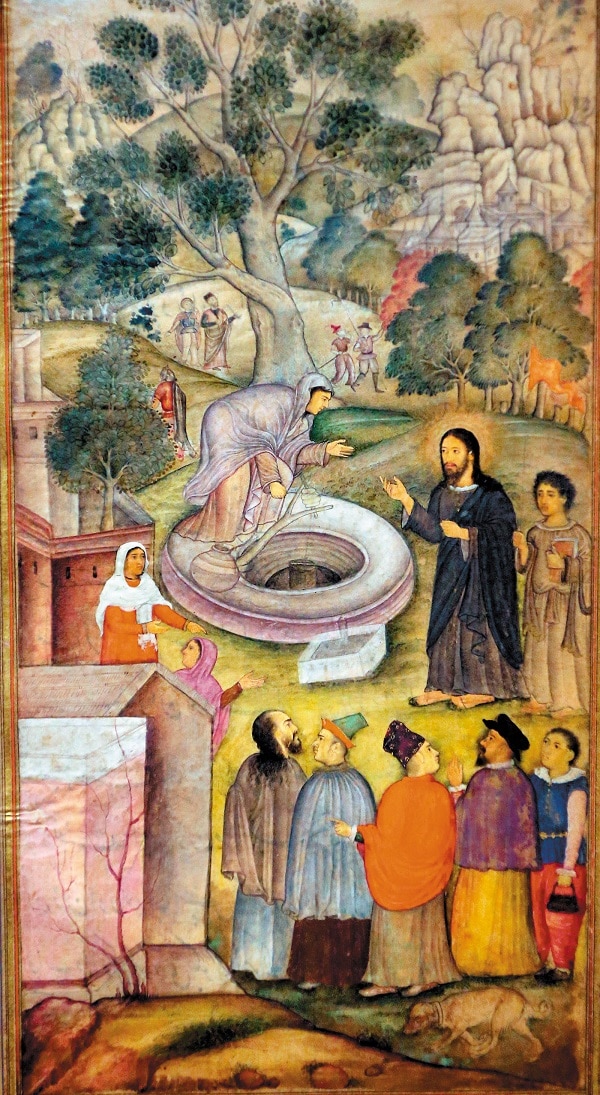In Chicago, all public Catholic Masses have been cancelled for duration of the coronavirus emergency. So, starting this past Saturday and Sunday, for the first time ever, all of the churches in the archdiocese are dark, open, if at all, only for private prayer.
Although the liturgy isn’t available, the readings are, and the Gospel is the important story of Jesus and the woman at the well.
Meek? Sassy?
This account is one of those cinematic and very human stories that we find in the Bible. You can see it unfold before your eyes, as if in a movie. In fact, I find it fun and useful to imagine a couple actors doing the scene.

Jesus and the Samaritan woman at the well; illustration from the Mirror of Holiness, an account of the life of Christ by the Jesuit priest Jerome Xavier for the Mughal emperor Akbar, India, 1602–1604
How, for instance, would the one actor convey that Jesus is tired after his journey?
How would the other say her lines to the request of Jesus for a drink? “How can you, a Jew, ask me, a Samaritan woman, for a drink?” What tone would she use?
Would she be meek? Argumentative? Sassy?
And, from there, the scene plays out in a lively give-and-take until the woman says something about the Messiah coming, and Jesus delivers the punchline of the scene:
“I am he, the one speaking with you.”
Sacred-writing
Great literature gives us insight into what it means to be human. In a way, all great literature is sacred-writing. The Bible is “official” sacred-writing and also great literature.
This resonant exchange between two human beings says something about what it means to be human and what it means to be a believer.
It also says something about how we meet God.
Jesus isn’t going to be the one who fills my order at Starbuck’s, but my interaction with the woman behind the counter — or with anyone — is something special and sacred.
As Jesus says in Matthew’s gospel:
“Where two or three are gathered together in my name, there am I in the midst of them.”
Being present
Today, everyone around the world is coming to recognize the need to keep our distance from each other until this outbreak of coronavirus is under control. We can’t “gather together” in person.
Nonetheless, it’s important, I think, to recognize that, even if we are physically apart, we can still keep in touch, through texting, through emails, through all the many digital ways, and through the phone.
On the phone, we may not be able to shake hands, hug or even see each other. But we can still listen. We can still be open about our own feelings and experiences.
Jesus and the woman at the well are both present to each other in their conversation. They are fully aware and attentive to each other in their back-and-forth conversation.
Being present to each other is an expression of love for each other. It will help us all get through this difficult time.
Patrick T. Reardon
3.15.20
Written by : Patrick T. Reardon
For more than three decades Patrick T. Reardon was an urban affairs writer, a feature writer, a columnist, and an editor for the Chicago Tribune. In 2000 he was one of a team of 50 staff members who won a Pulitzer Prize for explanatory reporting. Now a freelance writer and poet, he has contributed chapters to several books and is the author of Faith Stripped to Its Essence. His website is https://patricktreardon.com/.
